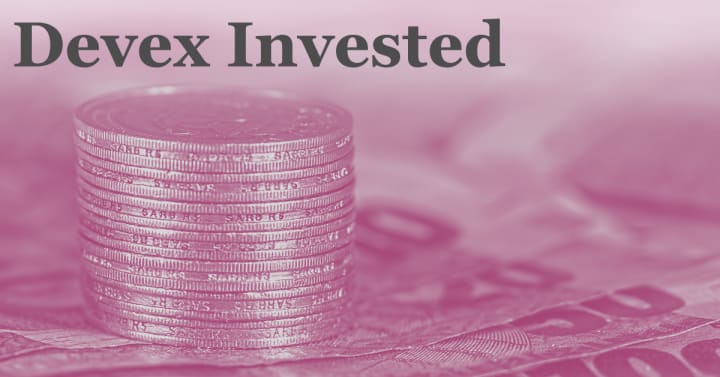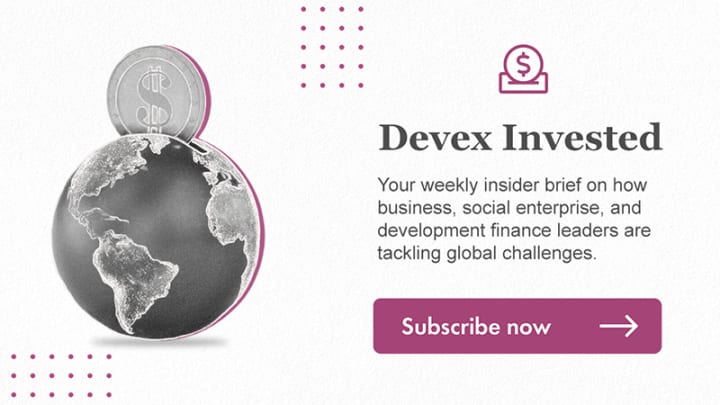
You likely remember the dramatic fall of private equity firm The Abraaj Group and its leader, Arif Naqvi. In 2018, Abraaj went from a darling of the global elite and development funders to being embroiled in a massive scandal of alleged fraud. Naqvi maintains his innocence, but two other former Abraaj executives have pleaded guilty to crimes.
As the clamor around the ability of business to solve the world’s problems has grown, I have been thinking about what lessons the incident might hold moving forward. So I chatted with Simon Clark, who recently co-authored a book about the saga: “The Key Man: The True Story of How the Global Elite Was Duped by a Capitalist Fairy Tale.” (It’s worth a read.)
This is a preview of Devex Invested
Sign up to this weekly newsletter inside business, finance, and the SDGs, in your inbox every Tuesday.
• Investors in Abraaj’s funds — including development finance institutions and the Gates Foundation — had “terrible” due diligence processes, relied on audited accounts, and took a long time to recognize that something was wrong, according to Clark.
• While legal action is ongoing, investors are hesitant to publicly discuss what went wrong. “I think this is a troubling aspect of the whole sort of private equity and DFI world – that there's a lack of transparency in general and in particular when things don't go well,” Clark says.
• As a result of the Abraaj collapse, emerging market private equity firms have a harder time raising funding, he says. And, as it turns out, Abraaj’s external promises that it could serve the lowest-income people were contradicted internally, with executives seeing that it could at best serve members of the growing middle class in low-income countries since they could actually pay.
• Clark suggests that impact investing needs to be a more inclusive conversation. “Too often, impact investing is like an elite sport. If they're not including poor people or people who live on a few dollars a day in how this movement and its products and services are shaped and created, I don't really see how it's going to improve outcomes for poor people,” he tells me.
Read: Can business solve global problems? Lessons from Abraaj
Overshadowed
Embattled IMF Managing Director Kristalina Georgieva seems to be safe in her position — for now. The fund released a statement Monday throwing its full support behind her and saying its review “did not conclusively demonstrate that the Managing Director played an improper role regarding the Doing Business 2018 Report when she was CEO of the World Bank.”
The scandal threatened to engulf the World Bank-IMF annual meeting, which is now underway — and raised questions over whether the institutions’ credibility had been shaken by the discovery of data manipulation.
Your next job?
Senior Investment Officer – Equity
Inter-American Development Bank
United States
Meanwhile, World Bank President David Malpass warned Monday that rising debts in the lowest-income countries are teetering toward unsustainable levels, as my colleague Shabtai Gold reported. Experts are hoping the meetings and the G-20 summit later this month will lead to solutions.
Read: World Bank warns of record debt levels in low-income countries
+ ICYMI: 5 things to watch at the World Bank-IMF annual meetings
Global corporate minimum tax: Who wins?
On Friday, 136 countries agreed to a new 15% global corporate minimum tax rate that would make it harder for companies to avoid paying taxes, according to the Organisation for Economic Co-operation and Development. It was not agreed to by four lower-income nations involved in the process: Kenya, Nigeria, Pakistan, and Sri Lanka.
While high-income countries will benefit more than their low-income counterparts in this deal, it is a “step in the right direction” and could help middle-income countries, Eric LeCompte, the executive director at Jubilee USA Network, tells me.
But not everyone is as enthusiastic. Tove Maria Ryding, tax coordinator at the European Network on Debt and Development, says that the deal “has strong biases towards the interests of larger and richer countries, at the expense of the world’s poorest countries” and that the negotiations were not inclusive or transparent.
Climate business
Nearly half of all African and South Asian business executives surveyed in a recent poll reported that extreme weather events have significantly affected their companies, writes my colleague Will Worley.
The survey, conducted by CDC Group, found that 78% of respondents said their businesses were taking or planning action to identify physical climate risks, while 70% said the same for transition risks associated with moving to a low-carbon world, such as policy and market changes.
Read: Climate change is already impacting African businesses
What we’re reading
European banks are raising prices and denying loan requests based on climate risk. [Bloomberg]
IMF says governments should boost oversight and verification to curb “greenwashing.” [Financial Times]
A University of Pretoria professor presents an argument for why IMF needs a strong ombudsman. [Financial Times]
A new report finds climate change philanthropy is growing — but not fast enough. [Devex]
Shabtai Gold contributed to this edition of Devex Invested.





